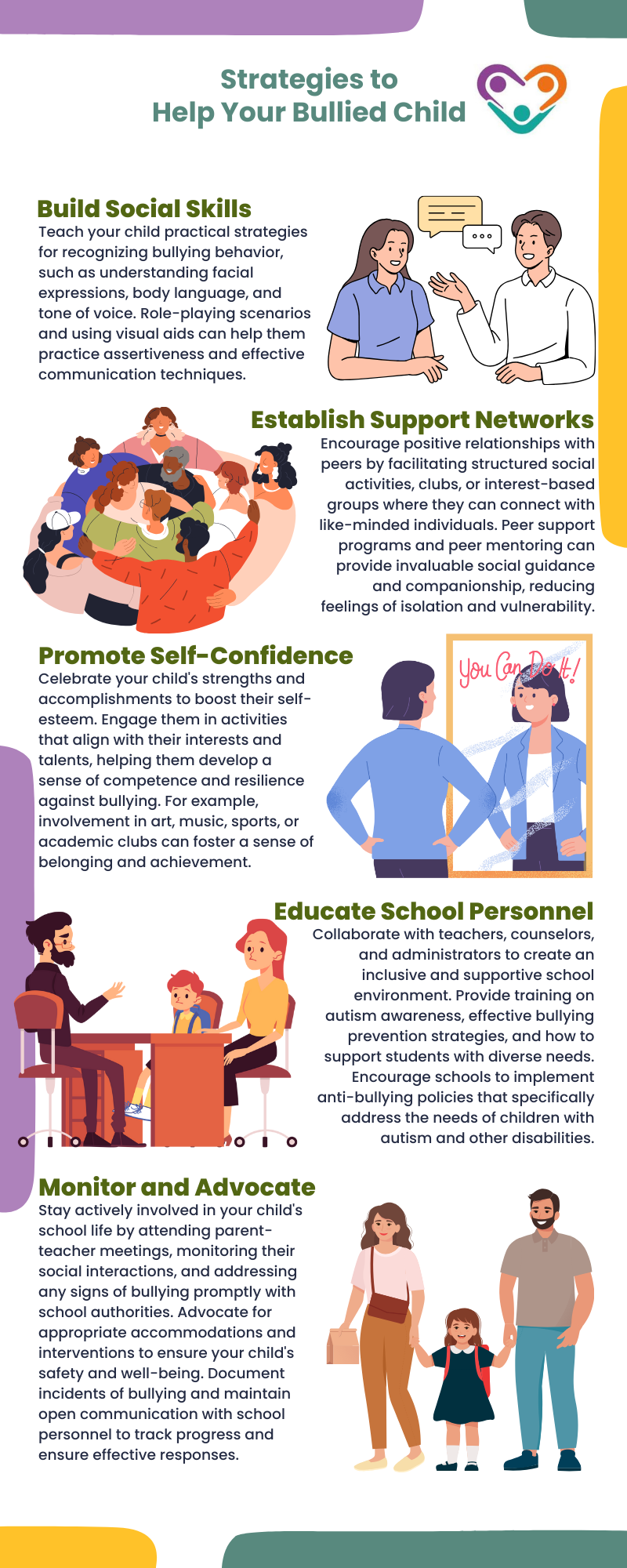Autism spectrum disorder (ASD) is a neurodevelopmental condition characterized by challenges in social communication, repetitive behaviors, and sensory sensitivities. Children with autism may struggle with interpreting social cues, understanding social norms, and forming friendships.
These differences can make them more susceptible to bullying, which can take various forms including verbal taunts, physical aggression, social exclusion, and cyberbullying.

Signs Your Child Might Be Bullied
Identifying bullying in children with autism requires careful observation and understanding of their unique behaviors and communication styles. Some tell-tale signs that your child may be experiencing bullying include:
- Behavioral Changes: Increased anxiety, withdrawal, or avoidance of social situations.
- Physical Symptoms: Unexplained injuries, bruises, or complaints of headaches and stomachaches.
- Emotional Responses: Heightened emotional distress, sadness, anger, or fearfulness.
- Academic Decline: Noticeable drop in academic performance, reluctance to attend school, or frequent absences.
- Social Withdrawal: Loss of interest in activities they previously enjoyed, or reluctance to interact with peers.
Since children with autism may have difficulty expressing their feelings verbally, it’s important to create a supportive environment where they feel comfortable discussing their experiences and emotions.
Research consistently shows that children with ASD are at a higher risk of being bullied compared to their neurotypical peers. Bullying can have profound and lasting effects on their mental health, self-esteem, and academic progress. It can exacerbate existing challenges related to social skills and peer relationships, leading to increased feelings of isolation, anxiety, depression, and in severe cases, suicidal ideation.
Strategies to Help Your Child
Navigating the challenges of bullying can be particularly daunting for children, especially those on the autism spectrum. Implementing effective strategies to support your bullied child is crucial for fostering resilience and ensuring their emotional well-being.
By understanding tailored approaches and supportive measures, you can empower your child to navigate these difficult situations with confidence and support. That said, here are strategies that you can follow as a parent or caregiver:

Legal Protections and Resources
Familiarize yourself with federal and state laws that protect children with disabilities, including the Individuals with Disabilities Education Act (IDEA) and Section 504 of the Rehabilitation Act. These laws mandate schools to provide reasonable accommodations, ensure non-discrimination, and address bullying effectively.
If necessary, work with school administrators and advocacy organizations to enforce these protections and ensure your child receives a fair and supportive educational experience.
In addition to understanding the legal frameworks, it’s beneficial to establish open communication channels with your child’s teachers and school staff. Building positive relationships fosters a collaborative approach to addressing your child’s unique needs and ensures that everyone involved is aligned with the accommodations outlined in their IEP or Section 504 plan.
Regularly scheduled meetings, such as IEP reviews or parent-teacher conferences, provide opportunities to assess progress, discuss any challenges, and adjust educational strategies as needed to best support your child’s development.
Moreover, staying informed about local resources and support networks can further empower you to advocate for your child’s educational rights. Community organizations, disability advocacy groups, and parent support networks often offer valuable guidance, workshops, and resources tailored to navigating the educational system.
These resources can provide insights into effective advocacy strategies, connect you with other families facing similar challenges, and offer emotional support through shared experiences.
Conclusion
Supporting a child with autism who experiences bullying requires a multifaceted approach that addresses their unique needs and challenges.
By building social skills, fostering supportive relationships, promoting self-confidence, educating school personnel, monitoring their experiences, leveraging legal protections, and promoting cultural sensitivity, parents can empower their children to navigate bullying situations more effectively and thrive academically and socially. If you’re seeking professional support, consider reaching out to an ABA therapist in NJ, New York, Georgia, or Indiana. Golden Care is here to help – contact us today to book an appointment or learn more about our services.
Sources:
https://www.autismspeaks.org/take-stand-against-bullying
https://www.chop.edu/news/health-tip/bullying-and-children-autism-how-help-your-child
https://www.autismparentingmagazine.com/asd-child-bullied
https://www.autismpartnershipsg.com/articles/autism-and-bullying-how-do-i-help-my-child

